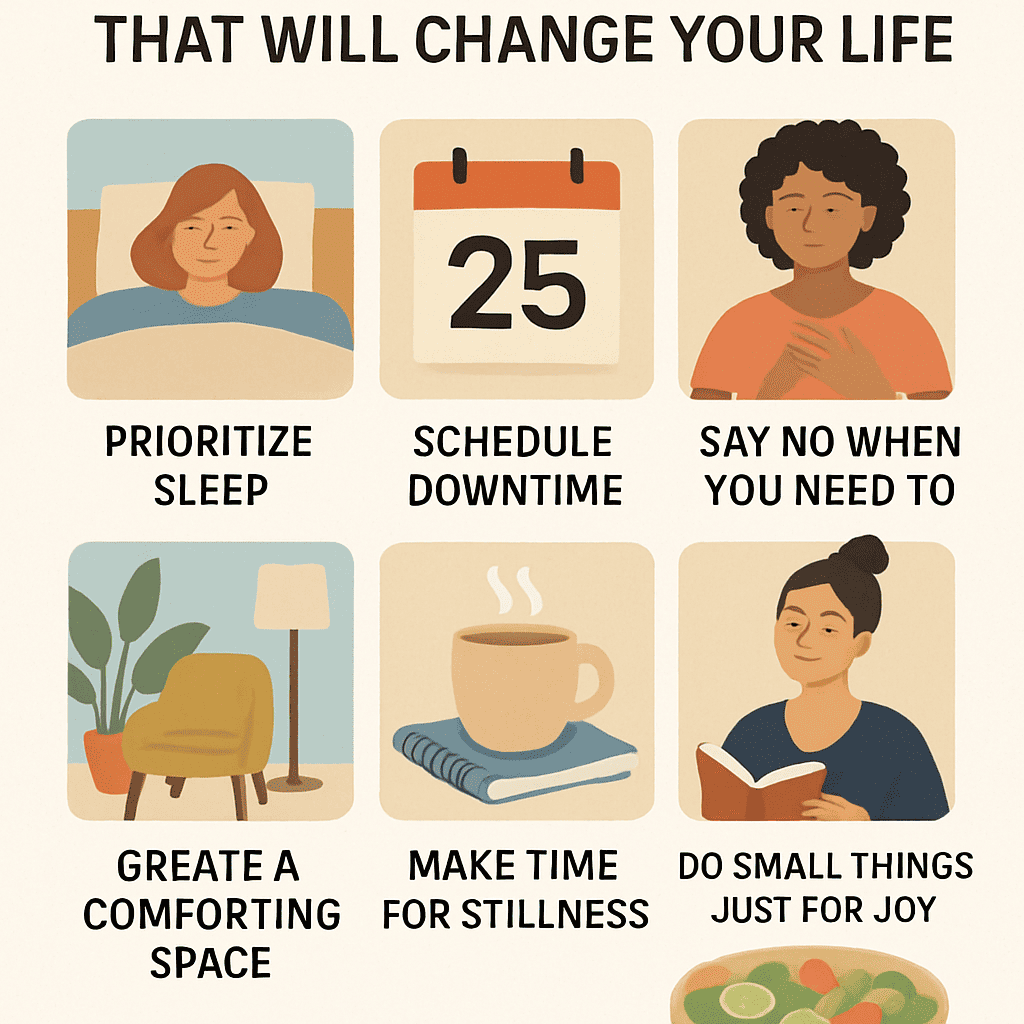Extreme self-care isn’t something you do once in a while when you’re burned out — it’s a daily commitment to honoring your body, mind, and soul. It’s not about perfection or aesthetics. It’s about creating space in your day-to-day life for the things that nourish and protect your well-being.
If you’re ready to feel more energized, present, and emotionally grounded, these 7 powerful daily practices will help you build a life that’s not just about surviving — but truly thriving.
1. Begin the Day With 10 Minutes of Stillness
Before the world starts demanding your attention, give yourself a moment of quiet.
This could be:
- Sitting in silence
- Deep breathing
- Meditation
- Gentle stretching
- Watching the sunrise
- Listening to calming music
This practice helps you regulate your nervous system before the chaos of the day begins. It’s a reminder that you come first — not your inbox, not your to-do list, not your phone.
Why It Works:
Stillness anchors you. It creates space for clarity, intention, and emotional balance.
2. Create a “Non-Negotiable Nourishment” Routine
Food is not just fuel — it’s self-respect. Creating a daily habit of nourishing meals and hydration is one of the simplest and most powerful ways to support your body.
Make it easy:
- Drink a full glass of water right after waking up
- Plan at least one colorful, balanced meal
- Avoid skipping meals to “stay productive”
- Eat slowly and mindfully, without distractions
Why It Works:
When you consistently nourish yourself, you tell your body: I care about you. That message matters — especially when you’re tired or stressed.
3. Take a 20-Minute Movement Break
Movement doesn’t have to mean a gym session. In extreme self-care, it means moving your body in a way that feels good, not punishing.
Ideas include:
- Walking outdoors
- Gentle yoga
- Dancing in your room
- Light stretching
- Pilates or bodyweight movement
Schedule this as you would a meeting. Make it a sacred pause.
Why It Works:
Movement releases endorphins, clears brain fog, reduces tension, and reconnects you to your body. Even 10–20 minutes can completely shift your energy.
4. Set and Enforce One Boundary Every Day
Boundaries are where self-care meets self-respect. Choose one boundary to practice each day — especially in moments where you’d usually say yes just to please others.
Examples:
- Don’t check email after 6 p.m.
- Say “no” to a request that drains you
- End a call when you’re exhausted
- Leave a group chat that overwhelms you
- Let someone know you’re unavailable today
Why It Works:
Daily boundary practice reinforces the idea that your time, energy, and emotions matter. It builds confidence and self-trust.
5. Unplug Intentionally From Screens
Digital burnout is real. Social media, emails, and news overload can cause anxiety, distraction, and emotional numbness. Extreme self-care involves intentional digital disconnection — even for a short time.
Try this:
- Designate 1–2 “screen-free” hours each day
- Put your phone in another room during meals
- Use apps to block social media after a certain time
- Delete apps that don’t support your mental well-being
Why It Works:
When you disconnect, you reconnect — with your thoughts, your body, your environment, and your true self.
6. Practice Emotional Check-Ins
Most people check their phones more than they check in with their own emotions. Emotional self-care requires noticing what you’re feeling, without judgment.
Create a daily ritual of asking:
- “How am I feeling right now?”
- “What do I need today?”
- “Where am I holding tension in my body?”
Write your answers down. Name the emotion. Let it exist without needing to fix it.
Why It Works:
This cultivates emotional intelligence, resilience, and self-awareness — key elements of extreme self-care. When you name it, you can nurture it.
7. End the Day With Restorative Rituals
Evenings are sacred. They’re your opportunity to reset, release, and rest. Instead of ending your day with mindless scrolling or collapsing from exhaustion, try gentle rituals that signal to your body and mind: It’s safe to rest now.
Options include:
- Taking a warm shower or bath
- Drinking herbal tea
- Journaling what went well today
- Reading a few pages of a calming book
- Using a lavender pillow or oil
- Going to bed 30 minutes earlier
Why It Works:
How you end the day affects how you start the next. A calm evening routine improves sleep, reduces anxiety, and helps you feel grounded and supported.
Start Small, But Stay Consistent
You don’t have to adopt all 7 practices at once. Choose one or two that resonate with you. Start there. Once those feel natural, add more.
The key to extreme self-care isn’t doing everything perfectly — it’s doing something consistently.
Every act of care, no matter how small, sends a powerful message to your body, heart, and spirit:
“I am worthy of love. I am worth the effort.”

